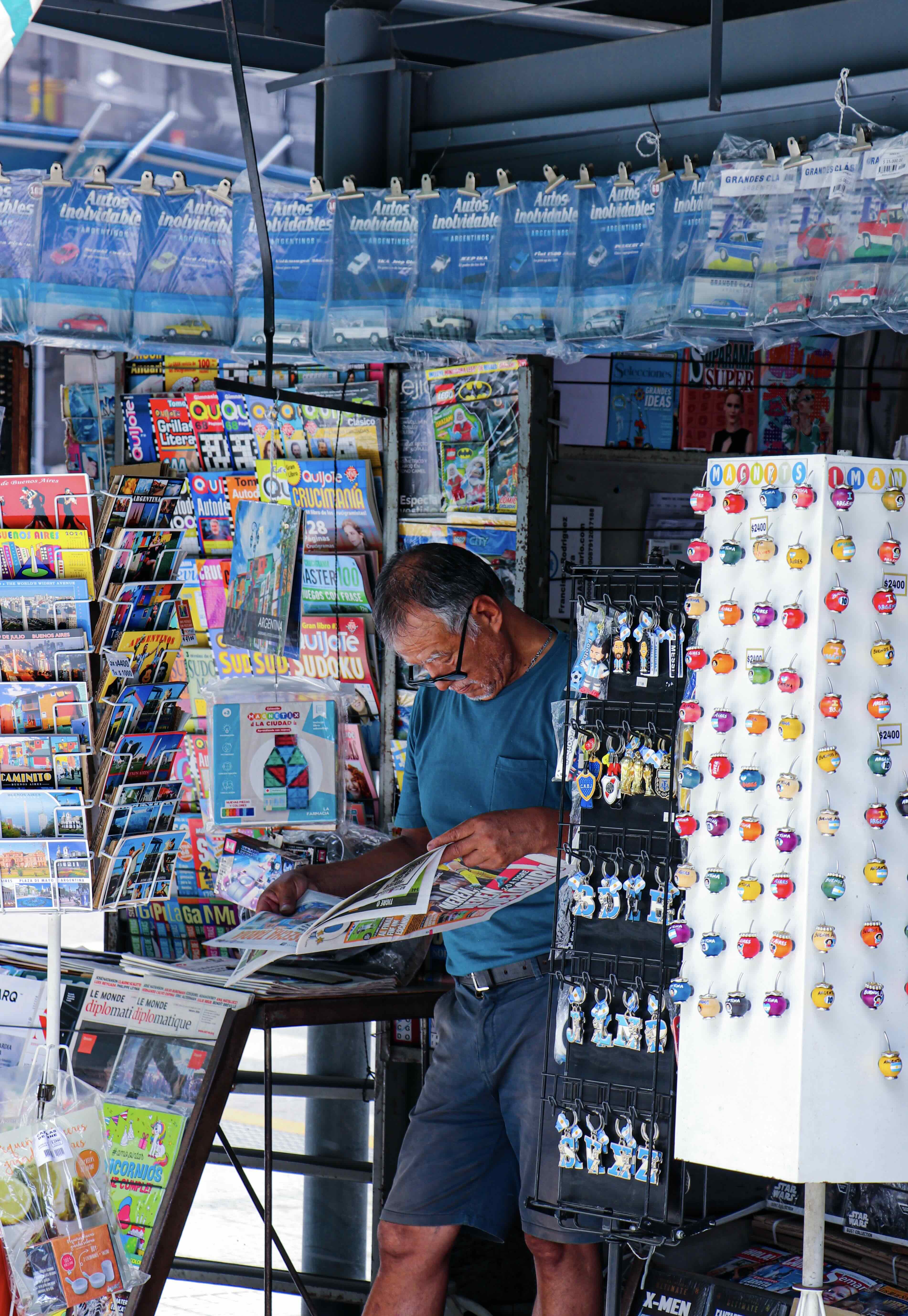The last chapter: Argentina's literacy legacy in peril

A local man reads the news for the day. Magazine stands can be found in almost every block in Argentina. (Blanca Estrada – Medill Reports)
By: Karishma Bhuiyan and Blanca Estrada
Medill Reports
BUENOS AIRES – Buenos Aires is considered the bookstore capital of the world, but independent shops are under attack as the right-wing government attempts to discard laws amid a 200% inflation rate. Silvina Rodriguez and Nurit Kastzelan each own a small bookshop and have curated each store’s catalog to be unique from other stores in the region. Due to the steep inflation rate, they worry they will not be able to keep up with corporate chains selling at cheaper rates. This attempt to discard laws comes after the election of Javier Milei, a right wing economist.
Transcript:
BHUIYAN: In the heart of Buenos Aires is Tierra de Libros, an independent bookstore where Silvina Rodriguez reshelves the books inside of her own home.
RODRIGUEZ: These are all Latin American classics. I mean, I have loved books my whole life.
BHUIYAN: A lifelong bookworm, Silvina’s passion is to promote Argentine literature and culture under her roof.
RODRIGUEZ: My parents were heavy readers, both of them. I have only one sister, and she’s quite a heavy reader too. So maybe it runs in the family.
BHUIYAN: Before this, she ran a typical bookstore but gave it up after six years because the profit margins were too slim.
RODRIGUEZ: I felt very depressed to be here with nothing to do in connection with books.
BHUIYAN: Silvina says being passionate is a national trait, whether it’s for soccer or books.
RODRIGUEZ: We don’t feel ashamed about showing our feelings, which is something that you don’t find much in other cultures. I feel that we’re kind of open. I don’t know if as people, Argentinians, we are people that are happy with our lives. I wouldn’t say that. But we are passionate.
BHUIYAN: With a literacy rate of over 98%, Buenos Aires is considered the bookstore capital of the world. It has around 25 bookstores for every 100,000 people, amounting to more than 700 bookstores in the capital city.
RODRIGUEZ: Now we are having really difficult times with such inflation. And, the price of books is really crazy, and so I have to just start reinventing myself in other ways.
BHUIYAN: But independent bookstores here are under attack. In December of 2023, Argentina elected a new president, right-wing economist Javier Milei. He’s trying to get rid of more than 600 laws, and his initial policies caused a 200% jump in inflation rate. Both of those are hitting bookstores hard. Local bookshop owners like Silvina are worried that Argentina’s publishing industry could face extinction.
PROTESTERS: “Cutting roads, throwing stones.”
BHUIYAN: Inflation has hammered domestic production, and a law that shielded the book industry is under threat. That law was passed in 2001. It fixed prices at every single point of sale; and that kept large booksellers in chains from lowering prices that would put small shops out of business.
RODRIGUEZ: The law would be very inconvenient. I think they say they do it just to cut down expenses, but this is just that they don’t know the business. It would be a big mistake.
BHUIYAN: Nurit also runs a bookstore from her home.
KASZTELAN: The bookstore is not at her best time right now. I have it. I like doing that. But it’s not the only thing I do.
BHUIYAN: Her once thriving store struggles as inflation has hit the country hard.
KASZTELAN: I think it will affect everybody because there really is no money because everything is getting up. So people, they cannot pay public transport. How would they pay for a book?
BHUIYAN: Nurit says allowing bigger chains to set lower prices will not just affect her little bookstore, it could also affect the country and its culture.
KASZTELAN: That’s the magic of literature. And I think it makes people think, and this government doesn’t want us to think.
BHUIYAN: But these bookstore owners have faith that the country’s passion for books and reading will win out in the end.
RODRIGUEZ: We have lots of libraries. It’s not only the bookshops. If you can’t buy a book, we have this kind of habit of going to the library and get a book. Of course, maybe it’s not for everybody. I feel in my case it is related to immigration. If anybody tells you, “Well, look here, kids don’t read. People don’t like reading,” It’s a lie. That’s not true.
BHUIYAN: President Milei’s first attempt at a vast overhaul was stalled in Congress. Now legislators are going article by article. The repeal of the book law will likely be debated in the coming weeks. While the future of bookstores in Argentina is uncertain. One thing’s for sure: Argentines will continue to read and keep their culture alive through print.

